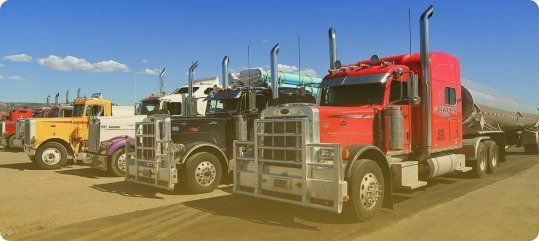Truck and car accidents have many similarities. Both can send victims to the hospital with serious and sometimes life-threatening injuries. Legally, both revolve around the issue of “fault”—identifying who is responsible for the accident.
However, car and truck accidents are also very different. If you were injured by a commercial vehicle, you might find it overwhelming to negotiate your own settlement for reasonable compensation. Truck companies and their insurers are also much more aggressive at defending these claims, and injured motorists could soon find themselves in over their heads.
At MG Law, our Conyers truck accident lawyers have negotiated many settlements for injured clients. We can explain what to expect as you fight for compensation, and we will gladly represent you.
More Serious Injuries
Getting struck by a two ton passenger sedan is no fun at all and can lead to fractures, brain injuries, disfigurement, and back problems. But now imagine getting crunched by a commercial truck weighing 40 tons. That’s the reality for those who are hurt by commercial trucks.
Typically, our truck accident clients show up to our office with more serious injuries. They require more expensive medical care and often require months of time at home recovering instead of working. In sum, truck accident injuries are often more costly for a client to absorb than injuries caused by a car collision. Very few people walk away unscathed from a truck accident.
When more money is on the line, a victim needs skilled legal representation. It is very easy to agree to a skimpy settlement because you don’t really know what your injuries are worth.
Trucking Company Responsibility
In most truck accidents, the trucking company is legally obligated to pay compensation to victims. This might be surprising. After all, isn’t it the driver’s fault if he cut you off in traffic or failed to stop in time?
Actually, it is, and a negligent driver is always liable for an accident. However, a trucking company is also on the hook for a couple reasons. For one, the trucking company hired the driver and might have been negligent when doing so. Think failure to perform background checks or forgetting to administer required drug/alcohol testing.
For another, Georgia law makes employers automatically liable when their employees negligently injure someone on the job. This legal principle is called “vicarious liability” or “respondeat superior.” Despite the funny names used, it’s a simple concept: whenever an employee injures someone in the course of employment, their employer is legally liable.
Difficulty Obtaining Fair Compensation
Trucking companies vigorously defend themselves because they know a lot of money is on the line. Here is what they will probably do in the weeks and months following a collision:
- A trucking company investigator will usually arrive at the scene of the accident within an hour to take pictures, interview people, and gather evidence.
- An investigator might contact you quickly after the accident to ask you questions about how you are feeling and what you remember of the crash. Investigators are usually digging for information they can use against you.
- The trucking companies insurer will trawl through your social media accounts looking for information about your injuries. For example, if you go to your sister’s wedding soon after the accident, they might use this fact to argue you aren’t seriously injured.
- The insurance company might tell you that you “don’t need a lawyer” and that you should agree to their settlement offer because it is the best they can do. This offer is probably much too low.
Without a lawyer by your side, you are at a serious disadvantage at negotiating a fair settlement from the truck company and its army of high-priced lawyers. Never go into negotiations assuming a big company wants to treat you fairly—they don’t. But we will always do what’s best of our clients.
Federal Regulations
Commercial trucks that travel across state lines are regulated by the Federal Motor Carrier Safety Administration, or FMCSA. This agency sets many rules regarding truck size, employer obligations, and hours of service. There is no comparable agency that regulates ordinary drivers in the United States.
Here is how federal regulations can come into play in a truck accident:
- The FMCSA requires that general freight trucks have at least $750,000 in insurance, while oil tankers carry at least $1 million. Motorists carry much less insurance.
- Trucking companies must keep records on the number of driver violations, including alcohol or drug violations.
- Truckers must keep logs that record the number of hours that they drive. The government also limits the number of hours a trucker can be on duty and driving each day/week.
The above information is often helpful in a truck accident case. For example, proof that a driver was on the road for too many hours is solid evidence of negligence. The same is true if the driver has multiple violations for being intoxicated and you smell alcohol on the driver’s breath after the incident.
To obtain this evidence, you need a lawyer with experience. At MG Law, we can force trucking companies to share information they would rather sweep under the rug. One reason truck companies defend themselves vigorously is that too many accidents could result in serious penalties. The FMCSA might levy serious sanctions against trucking companies with poor safety records.
Multiple Defendants That Share Fault
A car accident typically involves only one defendant—the other driver who hit you or forced you from the road. You can identify this person pretty easily at the scene of the accident, and you should swap insurance and personal information.
But a truck accident is different. There could be multiple people responsible for the collision. And you might have to perform a more extensive investigation.
For example, the trucking company could be responsible, as mentioned above. Their hiring practices or disciplinary procedures could be inadequate, which makes them responsible for the wreck. They owe the public a duty of care, and poor employment practices violate that duty.
Another example is the company that loaded the goods into the back of a tractor-trailer. This is often a different company than the company that owns the truck. If they did a poor job—making the load imbalanced, for example—then they bear some of the responsibility for the accident.
Another entity could be the mechanic who worked on the truck. He could have failed to identify a problem or done poor work. If a tire falls off the truck, for example, it could be because a mechanic did not do his job properly when mounting it.
In other accidents, the truck manufacturer could be responsible, especially if the truck has a defect. Some trucks are designed poorly, or there is some flaw in the way it is manufactured or put together. Under Georgia law, a manufacturer is liable for injuries when their unreasonably dangerous products injure someone.
These are only some of the more common defendants. Others could be the owner or contractor at a construction job site, if a vehicle struck you when pulling in or out. If the truck driver was intoxicated, then the establishment that sold him alcohol could be to blame, also.
Get The Legal Help You Need
MG Law is on the front lines representing accident victims when they are hurt by large commercial trucks. Please contact us today. Obtaining a just settlement is never easy, regardless of the accident. But seeing a truck company on the other side ensures a long, hard fight to get the compensation you deserve. We offer free consultations, which you can schedule by calling us today.


